How the 4 Parenting Styles Affect Academic Success
Written by Eryn Gordon

Academic success is a crucial aspect of a child’s development, and it often begins with parenting styles. The way parents interact, support, and discipline their children can significantly impact their educational journey.
While parenting styles play a significant role in early years, as children grow older, their peers also start to influence them.
In this blog, we’ll explore the four types of parenting styles and how they can affect a student’s academic success.
What Are Parenting Styles?
Parenting styles refer to the approaches and strategies parents use to raise their children. These styles differ among parents and are influenced by various factors, including culture, personal beliefs, and individual parenting experiences.
If you consider different types of parents, you might see a link between their behaviors and how their children react. It’s important to consider the positive and negative outcomes for each type. For example, a parent who imposes strict rules might have children who can follow them closely. However, a negative outcome could be that the child is risk-averse and might not take chances.
Alternatively, a parent who isn’t rigid and allows their children to have more freedom might have kids who are less fearful, but may not be able to follow directions or meet deadlines well.
Because behavior at home shapes the way children operate in the classroom, a parent might be able to see crossover based on their style. Parenting styles can have a profound impact on students’ academic abilities, although as students enter their college years, friends begin to exert more influence than parents.
What Are the Four Types of Parenting Styles?
The four primary types of parenting styles are outlined below:
Authoritative: Combines warmth and support with reasonable expectations and consistent discipline.
Authoritarian: Is characterized by strict rules and high demands.
Permissive: Involves low demands and high responsiveness.
Neglectful: Is marked by low levels of both support and demands.
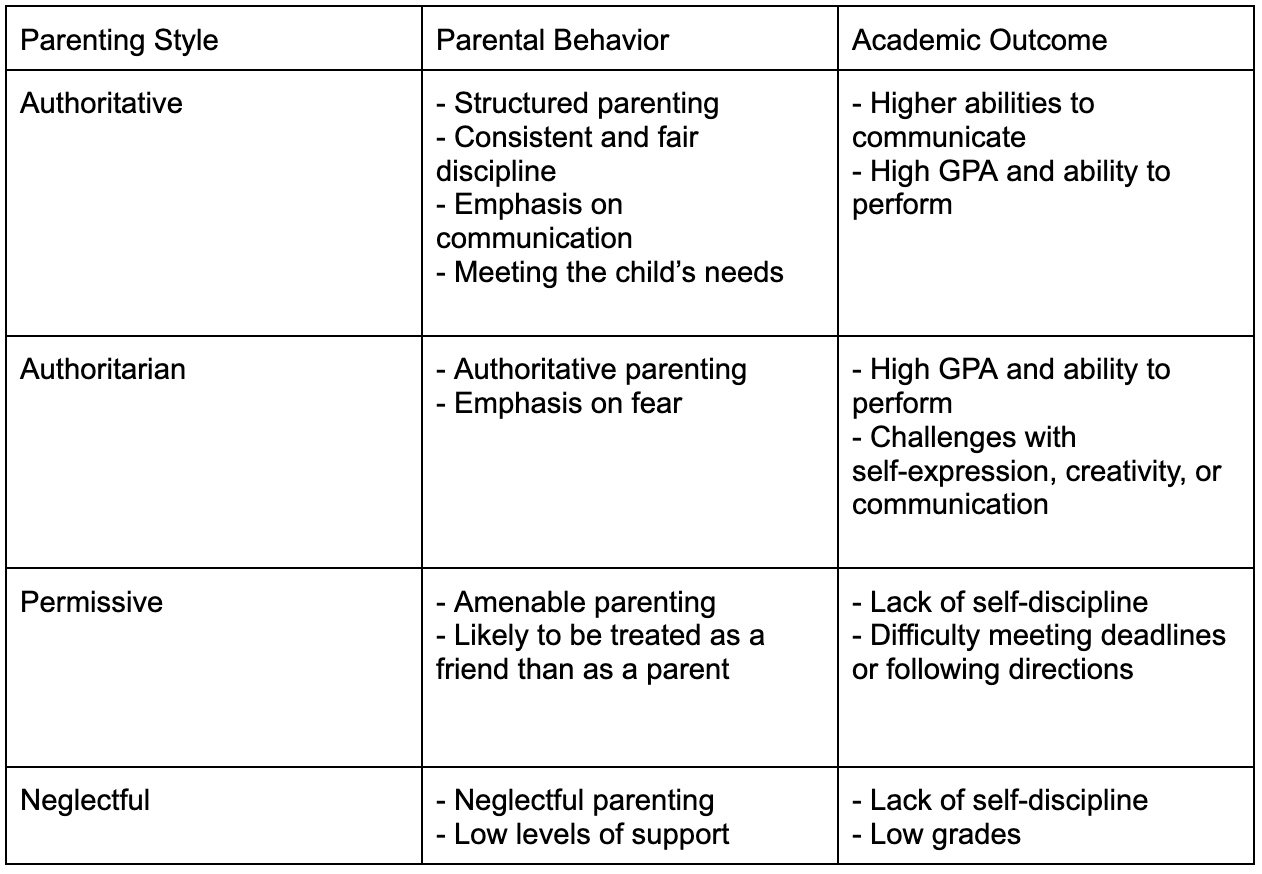
1. Authoritative Parenting Style
Authoritative parenting fosters a balanced and supportive environment for academic success. Parents who adopt this style provide guidance, set clear expectations, and encourage independence.
This parenting style is characterized by high levels of support and warmth combined with reasonable expectations and consistent discipline. Parents who adopt an authoritative style tend to be responsive to their children’s needs while also setting clear rules and expectations.
Research suggests that students who experience authoritative parenting tend to perform better academically. They often have higher self-esteem, better problem-solving skills, and are more likely to be self-motivated and academically engaged.
A study found that authoritative parenting rendered the most successful kids in college. Students who experienced authoritative parenting styles had higher GPAs than those experiencing authoritarian parenting styles, but not those experiencing permissive parenting styles.
TV Show Example: “Modern Family” – Claire and Phil Dunphy exhibit authoritative parenting by setting clear rules, providing guidance, and fostering open communication with their children.
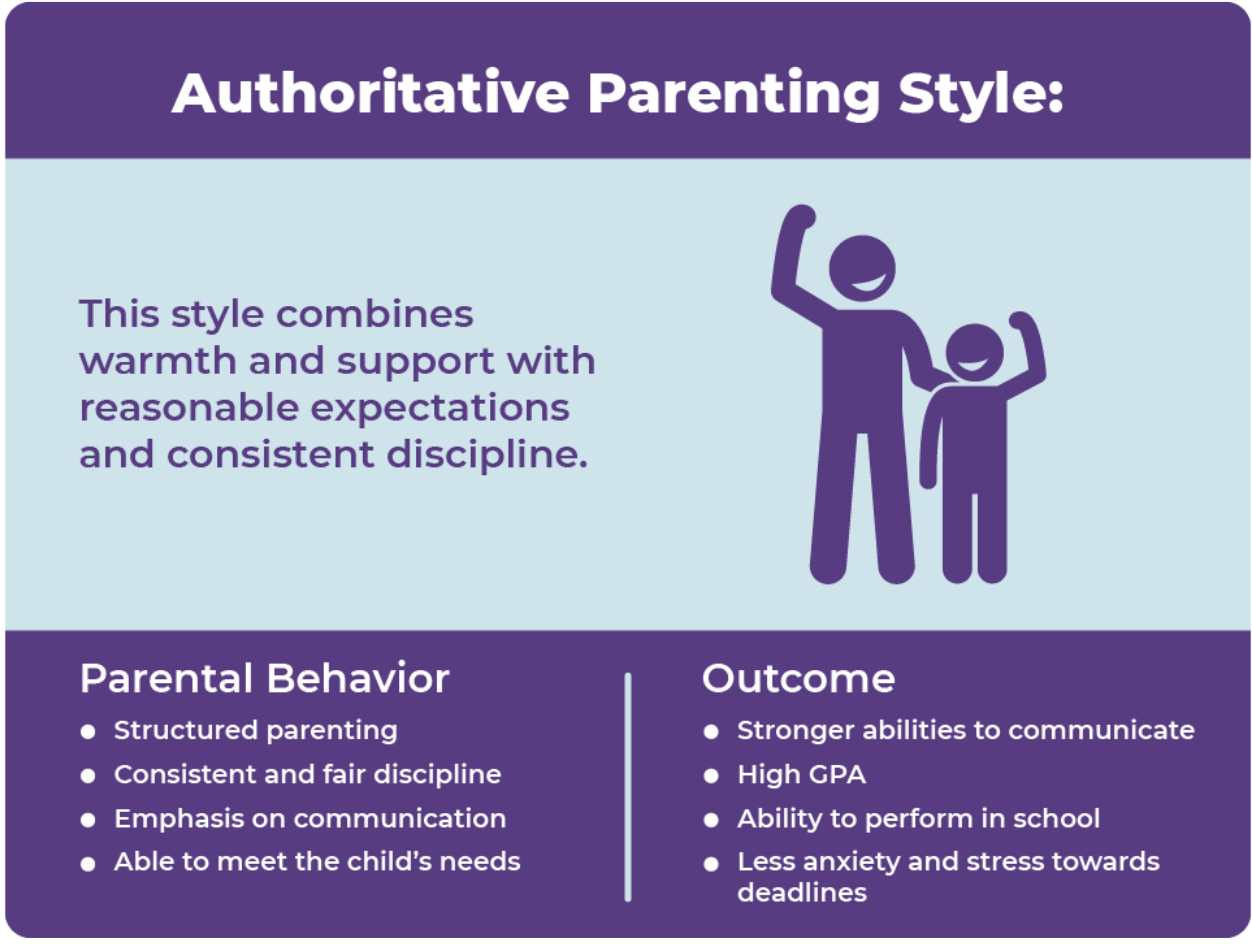
2. Authoritarian Parenting Style
Authoritarian parenting, characterized by strict rules and little flexibility, can have mixed effects on a student’s academic success. Authoritarian parenting is characterized by high demands and strict rules with little room for flexibility. Parents who adopt an authoritarian style tend to have high expectations but offer limited emotional support and nurturing.
Students raised under authoritarian parenting may experience higher levels of stress and anxiety. While they may achieve academic success due to the emphasis on discipline, they may also struggle with creativity, independent thinking, and self-expression. Excessive control can hinder their ability to explore and develop critical skills.
TV Show Example: “Malcolm in the Middle” – Lois and Hal exhibit authoritarian parenting by enforcing strict rules and using a disciplinary approach with their children, often resorting to punishments.
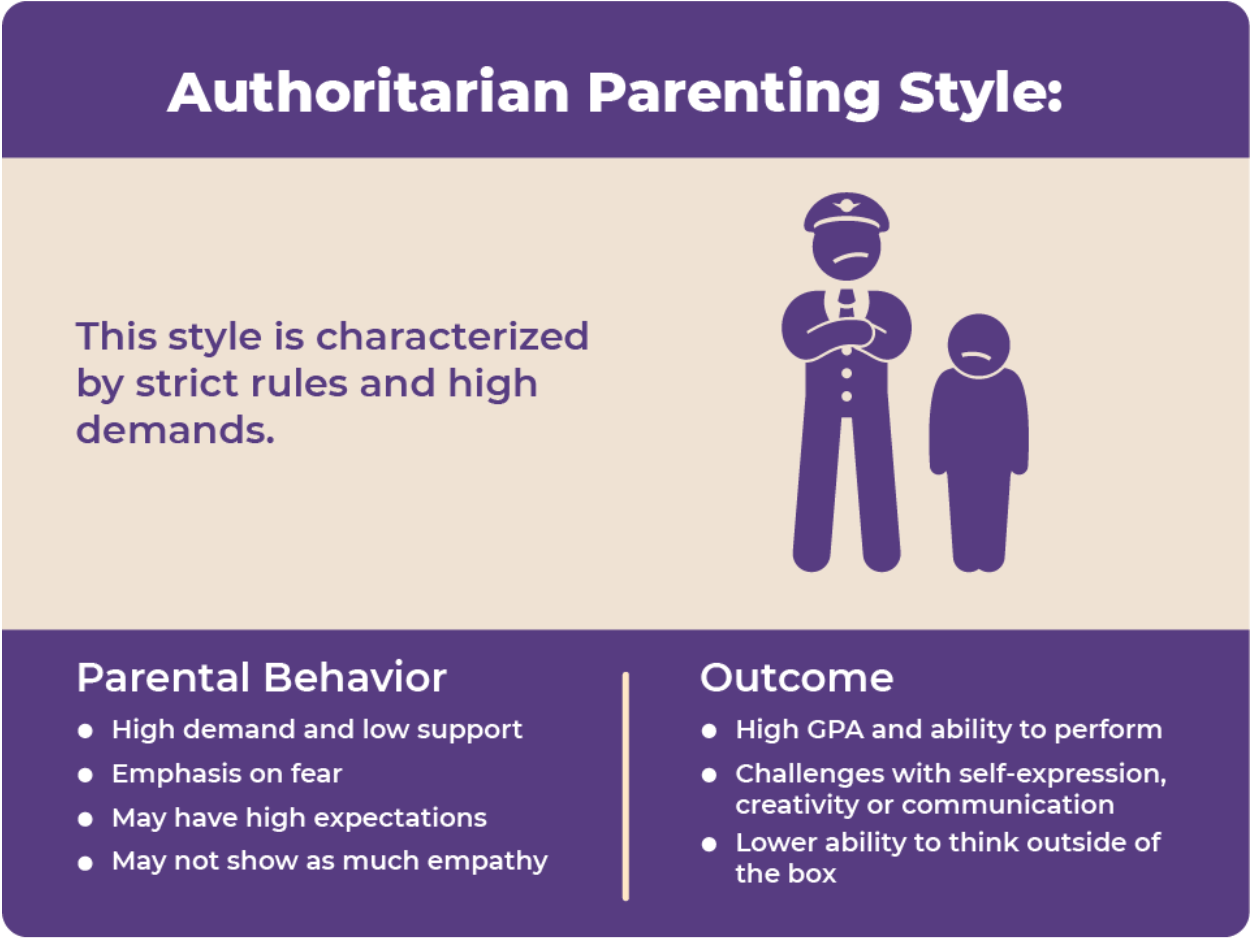
3. Permissive Parenting Style
Permissive parenting, with its lack of structure and rules, can negatively impact a student’s academic success. Permissive parenting is characterized by low demands and high responsiveness. Parents who adopt a permissive style tend to be indulgent, placing minimal demands or rules on their children.
Students raised under permissive parenting may have difficulty with self-regulation, impulse control, and academic achievement. They may struggle with following routines, meeting deadlines, and taking responsibility for their education. Without clear boundaries, they may have difficulty establishing effective study habits and may not prioritize education.
TV Show Example: “Friends” – Carol and Susan, who raise Ben (the child of Susan and Ross), demonstrate permissive parenting by being lenient and allowing their child considerable freedom without imposing many rules or boundaries.
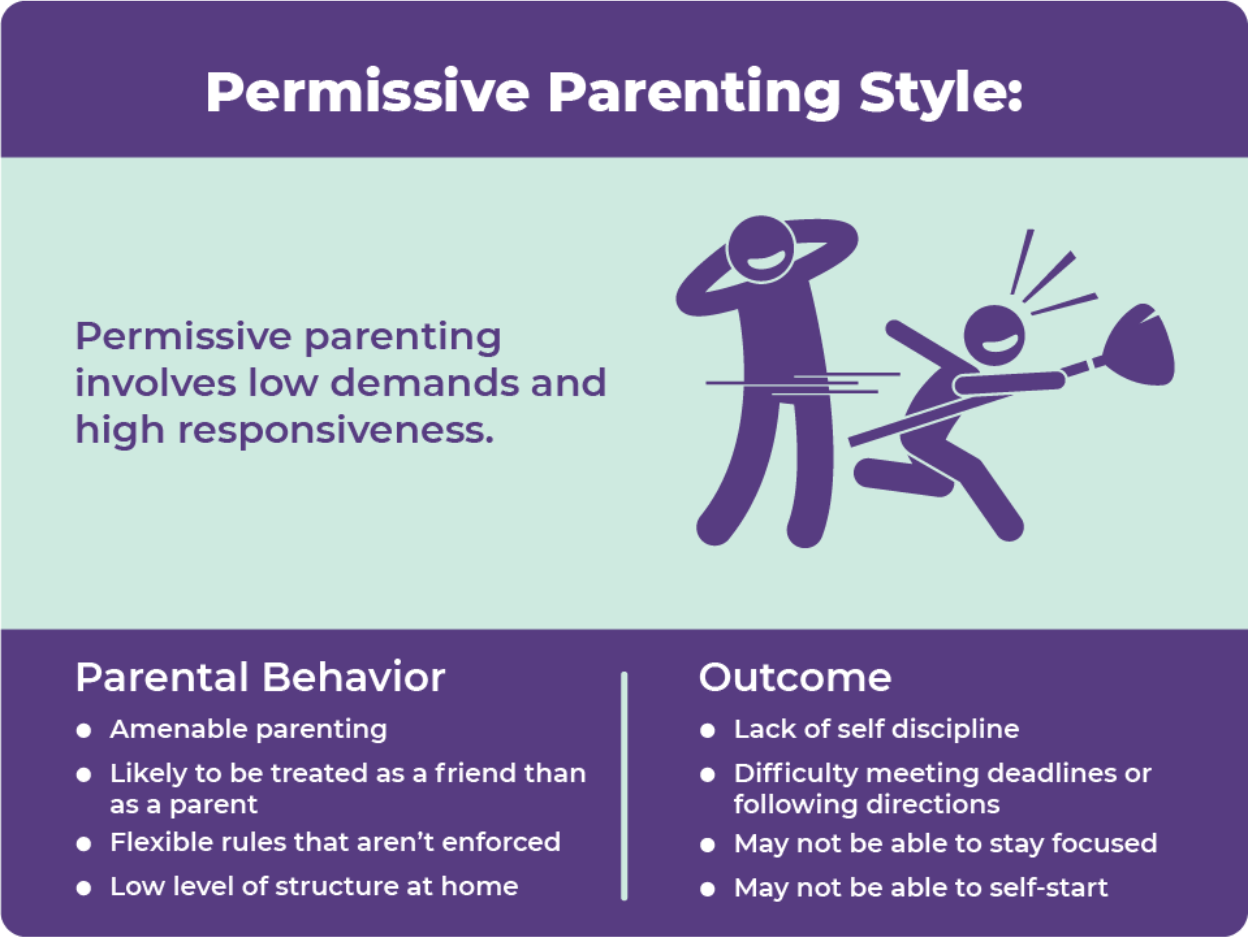
4. Neglectful Parenting Style
Neglectful parenting, marked by emotional detachment and lack of involvement, can significantly hinder a student’s academic success. Neglectful parenting is characterized by low levels of both support and demands.
Students raised under neglectful parenting may experience a range of negative outcomes, including lower academic achievement, lower self-esteem, and difficulties with social interactions. Children raised under neglectful parenting often lack the necessary support, guidance, and resources required for educational achievement.
Movie Example: “Matilda” – Matilda’s parents neglect her emotional needs, fail to provide support or guidance, and are disengaged from her education and well-being.
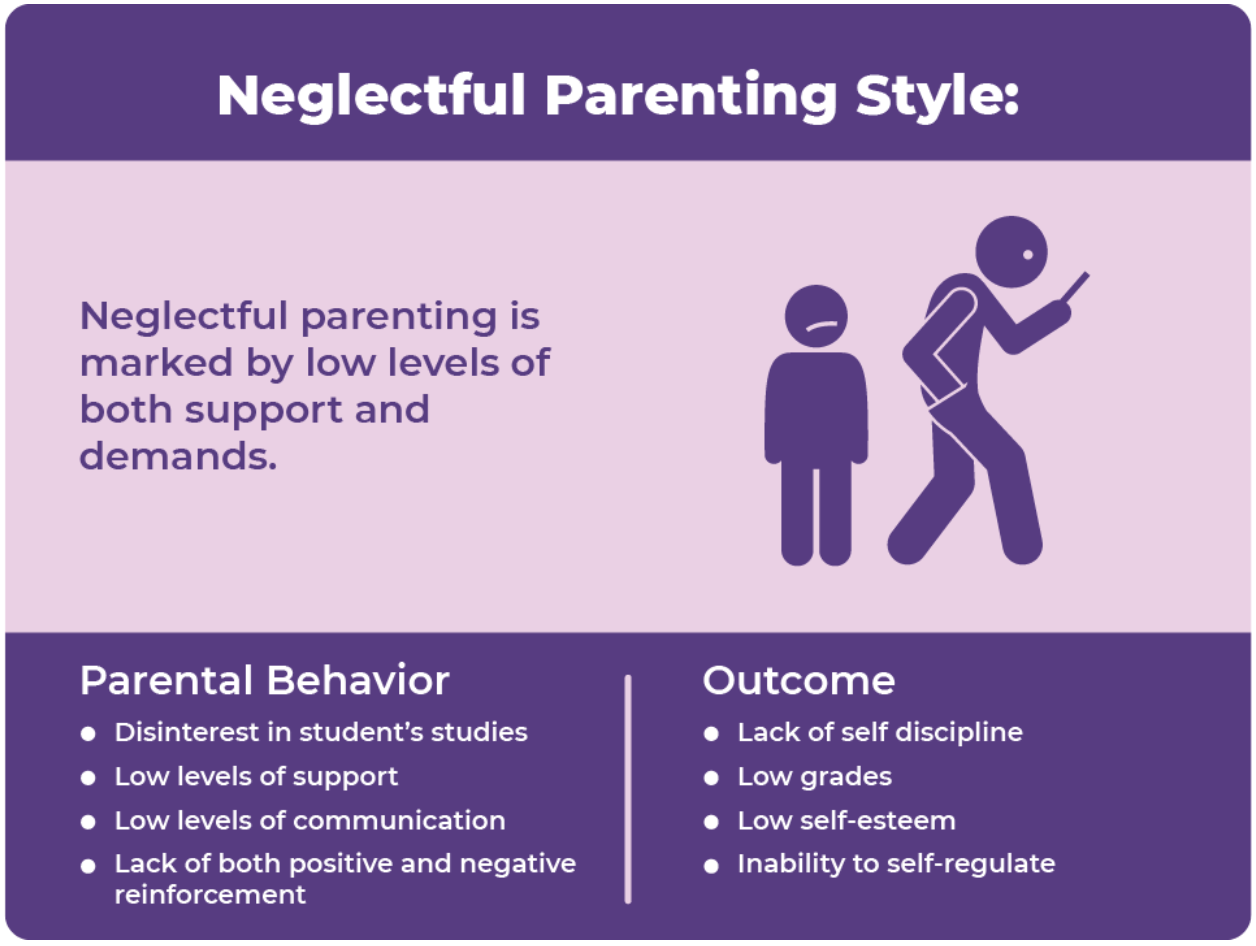
Tips on Building a Healthy Parenting Style
Positively impacting your child’s education starts with you.
No. 1: Set Rules and Discipline Consistently
Establishing clear and consistent rules helps children develop self-discipline and a sense of responsibility. Just as a reward system is crucial, so is consistent and fair discipline.
It’s important for a child to understand why they’re being disciplined as this will help them create connections between their actions and positive and negative outcomes.
No. 2: Create a Reward System
Implementing a reward system can motivate children to achieve academic goals and reinforce positive behaviors. One of the key elements of the authoritarian parenting style is positive reinforcement when the child performs well.
A reward system, such as cooking their favorite meal when they ace a test, can establish a sense of visibility.
No. 3: Emphasize Open Communication
One of the cornerstones of Knovva’s holistic approach to academic success is to foster a secure line of communication between parents and children.
Kids who feel they can talk to their parents are more likely to approach challenges with a positive attitude and feel less isolated.
Encouraging open and honest communication between parents and children creates a solutions-focused environment.
No. 4: Consider Partnering with a Consultant
We’ve learned that a student’s ability in school starts at home. However, in some cases, parents may not know how to connect with their students. This can happen when there’s a long history of miscommunication or behavioral challenges.
Education consultants go beyond the typical responsibilities of an advisor. Instead of focusing entirely on improving a student’s academic performance, Knovva takes a holistic approach that focuses on both the student and their parents. We act as a mediator, assisting parents in building trust and developing effective communication skills, which ultimately lead to improved academic abilities.
Learn More About Parenting Styles
Parenting styles play a crucial role in shaping a student’s academic success. Authoritative parenting tends to foster positive outcomes, while authoritarian, permissive, and neglectful styles can have adverse effects.
By being aware of their parenting style and implementing positive strategies, parents can positively impact their children’s academic abilities. Consistent discipline, a reward system, and open communication are essential components of a healthy parenting style.
By adopting effective approaches, parents can create an environment that nurtures their children’s educational journey and sets them up for future success.
Ready to find your parenting style? Take the quiz.
Sources:
https://www.ncbi.nlm.nih.gov/pmc/articles/PMC4927255/
https://sc.edu/about/offices_and_divisions/research/news_and_pubs/caravel/archive/2022/2022_parenting.php#:~:text=Students%20who%20experienced%20authoritative%20parenting,parenting%20styles%20(Figure%201).